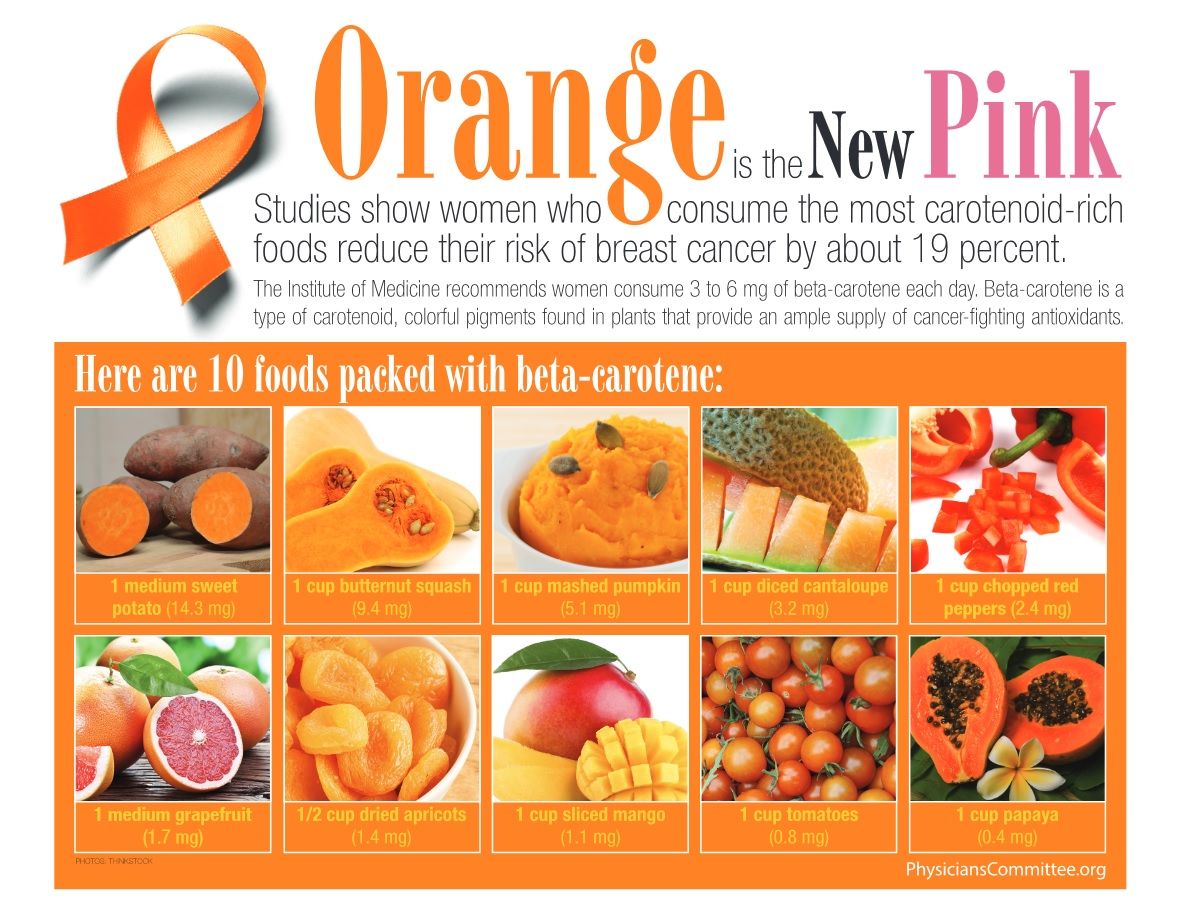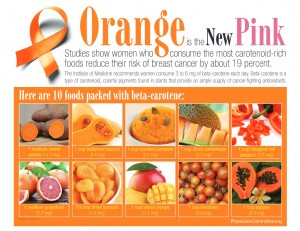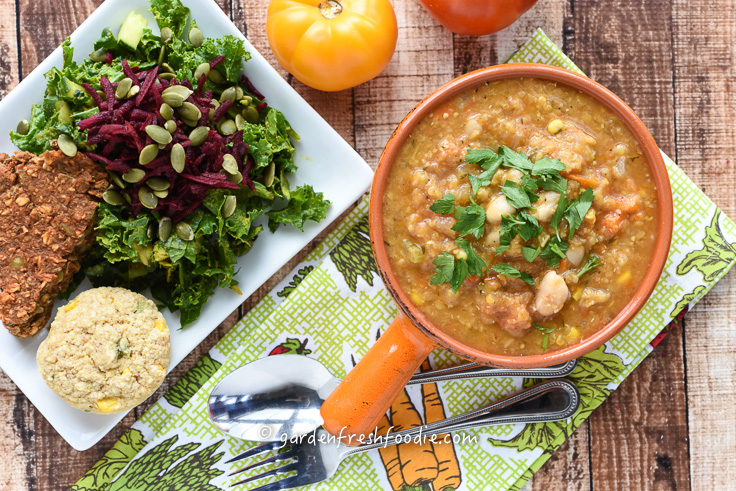
Orange is the New Pink
 October brings with it beautiful fall foliage, warming foods, and the topic of breast cancer awareness. We feel that dental health is an important part of overall health. Breast cancer awareness and prevention is a part of that equation. For those going through or have gone through chemotherapy, dental health can suffer. We strongly recommend that you increase dental visit during this time to stay ahead of periodontal disease taking hold. We do want to bring attention to a topic rarely discussed when we speak about breast cancer, prevention. Orange is the New Pink is a slogan taken from the Physicians Committee For Responsible Medicine, a non-profit that seeks to fight Type 2 diabetes and other Western Diseases. Breast cancer is the top cancer impacting women (2nd cause of cancer death), followed by lung (#1 cause of cancer death) and colorectal cancer. All three are largely linked to diet and lifestyle, however very little attention on breast cancer prevention occurs.
October brings with it beautiful fall foliage, warming foods, and the topic of breast cancer awareness. We feel that dental health is an important part of overall health. Breast cancer awareness and prevention is a part of that equation. For those going through or have gone through chemotherapy, dental health can suffer. We strongly recommend that you increase dental visit during this time to stay ahead of periodontal disease taking hold. We do want to bring attention to a topic rarely discussed when we speak about breast cancer, prevention. Orange is the New Pink is a slogan taken from the Physicians Committee For Responsible Medicine, a non-profit that seeks to fight Type 2 diabetes and other Western Diseases. Breast cancer is the top cancer impacting women (2nd cause of cancer death), followed by lung (#1 cause of cancer death) and colorectal cancer. All three are largely linked to diet and lifestyle, however very little attention on breast cancer prevention occurs.
Causes of breast cancer:
- Genetic, this cannot be controlled, but the following causes can contribute to the trigger of breast cancer cell growth.
- Obesity-obese women are at a much great risk of breast cancer than those who maintain a healthy weight, which is why a healthy diet reduces breast cancer risk
- Alcohol use
- Inactivity-moderate daily exercise decreases obesity risk, as well as boost healthy metabolic activity.
Taken from the Physicians Committee for Responsible Medicine:
Women across the country should swap their pink ribbons for orange vegetables this Breast Cancer Awareness Month if they really want to improve their odds of fighting the disease that kills tens of thousands of women each year.
Research shows that women who consume the most carotenoid-rich fruits and vegetables reduce their risk for breast cancer by about 19 percent, according to Susan Levin, M.S., R.D., director of nutrition education for the Physicians Committee and author of Applying the Precautionary Principle to Nutrition and Cancer guidelines, which was published in the Journal of American College of Nutrition. Carotenoids are colorful pigments found in plants that provide an ample supply of cancer-fighting antioxidants.
The Institute of Medicine encourages women to consume 3 to 6 milligrams of beta-carotene—a carotenoid in dark green, orange, and red vegetables—each day to reduce the risk of breast cancer. One medium sweet potato contains two to three times the recommended dietary intake of beta-carotene, which will help reduce the risk for cancer and boost the immune system. Other good sources of beta-carotene include:
| Carotenoid Vegetable | Serving Size | Beta-Carotene |
| Spinach Kale Mustard Greens Carrots Butternut Squash Pumpkin Cantaloupe Red Peppers |
One cup (cooked) One cup (cooked) One cup (cooked) 12 baby carrots One cup cubed (cooked) One cup (mashed) One cup (sliced) One cup (chopped) |
11.3 mg 10.6 mg 10.4 mg 10.1 mg 9.4 mg 5.1 mg 3.2 mg 2.4 mg |
In addition to carotenoid-rich vegetables, natural soy products, such as edamame and soy beans, provide protective benefits for cancer prevention and overall health.
What’s good for preventing breast cancer, is also good for dental health
Some additional steps you can take to help to reverse disease and reduce your risk of both breast cancer and periodontal disease:
- Eat MORE than 5 servings of fruits and veggies a day! Fruits and veggies are packed with antioxidants to fight disease and prevent cancer
- Boost your fiber (did you know that less than 9% of Americans get the recommended amount of fiber!)-by eating those fruits & veggies, as well as getting in servings of legumes like lentils, chickpeas, black beans, cannellini beans, pinto beans, and ALL other kinds of beans and lentils!
- Skip the processed stuff!!! Eat WHOLE foods-the less processed your foods are, the more nutritious they are. Eat foods you can recognize, and avoid foods with long lists of ingredients, especially those you can’t identify
- Limit sugar-sugars have been found to feed cancer cell growth. Eating unrefined sugars in the forms of fruits, with intact fiber and micronutrients, is the best way to curb that sweet tooth and break your sugar addition. Plus-it’s better for your teeth!!
- Avoid oils-oil provides no nutrition other than fat calories. Diets high in fat have been shown to increase inflammation in the body and lead to cancers, heart disease, diabetes, Alzheimer’s, and periodontal disease
- Avoid dairy-dairy is inflammatory. Cancers feed on inflammatory foods
- Eat a whole, plant-based diet-plant-based foods are nutrient dense and have high fiber amounts. Fiber will fill you up and satisfy you, which helps you to eat less overall calories
- Buy organic whenever possible-pesticides, insecticides, and herbicides have been linked to higher rates of cancer
- Start your kids off on the right track! Cancers can grow slowly, and many occurrences of cancer have been growing for years before they are detected
- Visit your dentist! If you have been diagnosed-visit your dentist! Changes in dental health during and after cancer treatment is common. Staying on top of your dental hygiene routine is important to prevent further periodontal disease.
***All of these steps will also help one lose weight. Overweight and obese women have a much higher incidence of breast cancer.
At Altman Dental, we are passionate about your dental and overall health. So much so, we have a blog devoted to healthy, plant-based recipes, as well as an employee who teaches plant-based cooking classes. Check out our blog www.gardenfreshfoodie.com for recipes high in antioxidants and low in saturated fat. Below is a great recipe for Late Fall Lentil Soup that is high in fiber, antioxidants, plant-based protein, and made oil free, and is fitting for Orange is the New Pink! 
Join us for upcoming whole food, plant-based cooking classes to learn ways you can incorporate more veggies into your weekly routine!
For a list of upcoming workshops and classes,visit Garden Fresh Foodie’s Healthy Cooking Class page